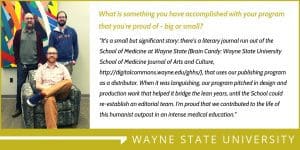In February 2019, we are publishing our second series of member profiles. These profiles showcase the wide variety of publishing work happening at member institutions, and celebrate our community’s contributions to the wider publishing landscape. This series will also spotlight resources the profiled institutions have contributed to the Shared Documentation library. Many thanks to the members who volunteered to answer our questions! See all of the published profiles, and look for a new one each week in February.
To learn more about their program, check out Wayne State’s latest Library Publishing Directory entry.
Tell us a bit about your publishing program.
Wayne State University Libraries’ publishing program grew out of our commitment to supporting scholarship on campus, to advancing open access in scholarly communications, and to creative service to our scholarly community. The journals that have found a home at the WSU Libraries each have a unique arrangement:
- a journal in applied statistics that another department could no longer support was rescued because our hosting platform represented a sunk cost that didn’t need to be recovered;
- because we were able to invite and train collaborators, a medical student journal could design a workflow that incorporates student editors and uses the platform as a pedagogical tool to introduce future doctors to scholarly publishing;
- and our experience developing hosting policy made it easy to draft an arrangement that opened up the backlist of a long-running fraternity journal.
We very much see these efforts as providing space or support for scholarly work that doesn’t fit in other parts of the publishing ecosystem, and therefore see our publishing program as a vital niche in supporting the overall scholarly endeavor at Wayne State.

Tell us something you have accomplished with your program that you’re proud of – big or small.
It’s a small but significant story: there’s a literary journal run out of the School of Medicine at Wayne State (Brain Candy: Wayne State University School of Medicine Journal of Arts and Culture) that uses our publishing program as a distributor. When it was languishing, our program pitched in design and production work that helped it bridge the lean years, until the School could re-establish an editorial team. I’m proud that we contributed to the life of this humanist outpost in an intense medical education.
Looking ahead, what are you excited about, or what’s on the horizon for your program?
This past year we welcomed Dr. Cheryl Ball to the Wayne State University Libraries, and we’re working on implementing Vega, her Mellon-funded open source publishing environment that makes supporting multimodal scholarship easier. We look forward to a beta release sometime in 2019, and we’re excited about the opportunities to develop pedagogical programs around the digital publication that Vega enables.
Tell us about an obstacle you are facing in your work or one that the field is facing as a whole.
There’s a concerted effort on the part of legacy scholarly publishers to get in front of the threat that populist support for open access publishing represents to their profit margins. Their general strategy seems to feature enclosure of the structures and initiatives that have grown to enable that open access movement. At the same time, certain high profile failures of library supported initiatives call into question our ability as a profession to sustain our own responses to these efforts. I think the challenge for the library publishing field involves organizing for our own power-both in the tools we create and the communities we cultivate-in ways that strengthen all involved and push back effectively against commercial efforts to co-opt our labor and our output.
Tell us about your experience participating in the community of library publishers. Has that experience influenced you or your work?
Oh, absolutely. Engaging with the Library Publishing Coalition, especially, has been really clarifying for me. It’s helped me acknowledge what I do well and identify what I don’t, contextualize my efforts, and move into areas where I can learn and grow and improve my practice. It’s given me a community of colleagues that has been critical in my growth as a professional and a person. And it’s lent a crucial legitimacy to library publishing as a field, so that I can better describe, defend and extend my efforts in my own spheres of influence.
Tell us about a resource you have contributed to the Shared Documentation library. How has it been useful internally? What made you decide to share it?
We’ve shared our template Memorandum of Understanding, because it outlines our base level service agreement for hosting journals on Digital Commons. It should be particularly useful to new library publishers using Digital Commons who are committed to Open Access publications, and can help libraries think through the services they will and won’t provide (for instance, we explicitly communicate that we won’t manage subscription lists). We’ve adapted this basic template for a number of hosting agreements.
